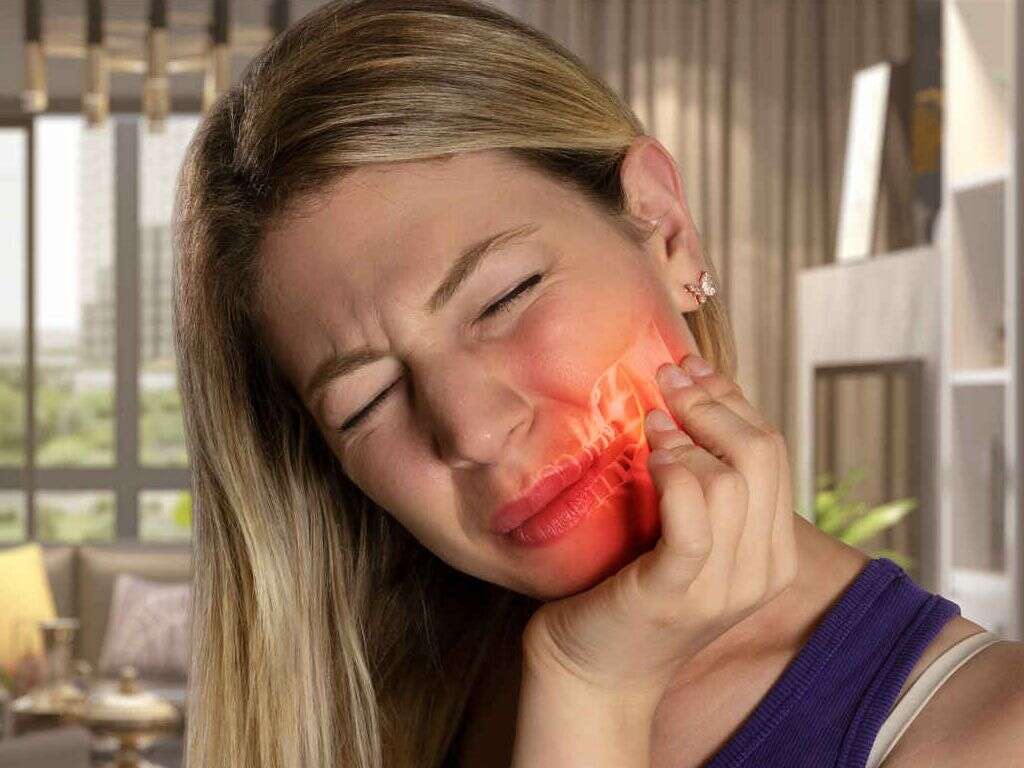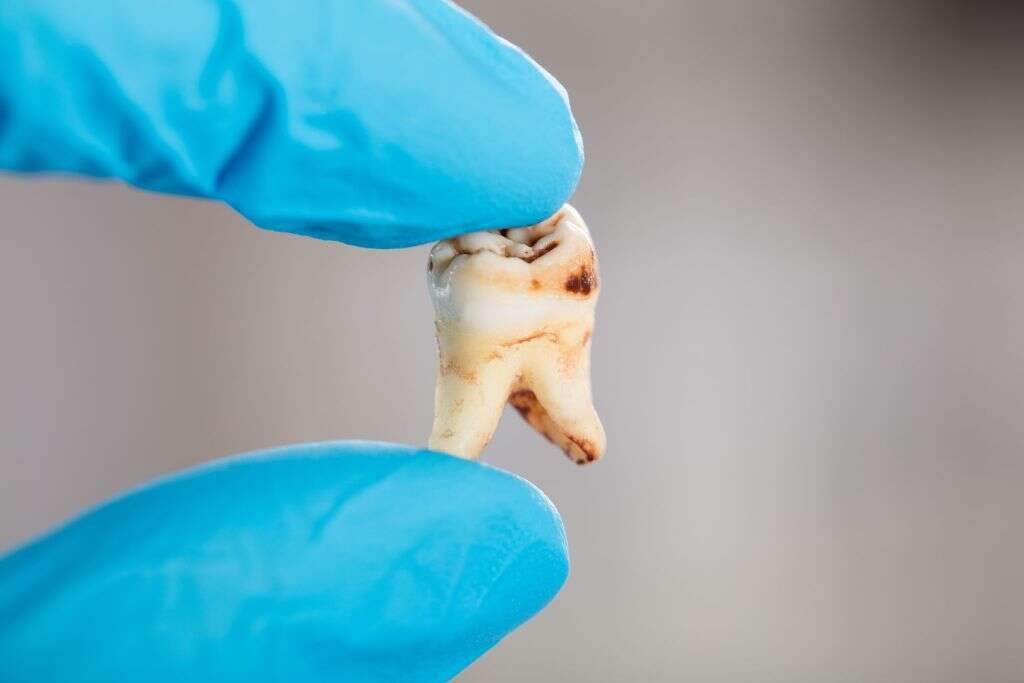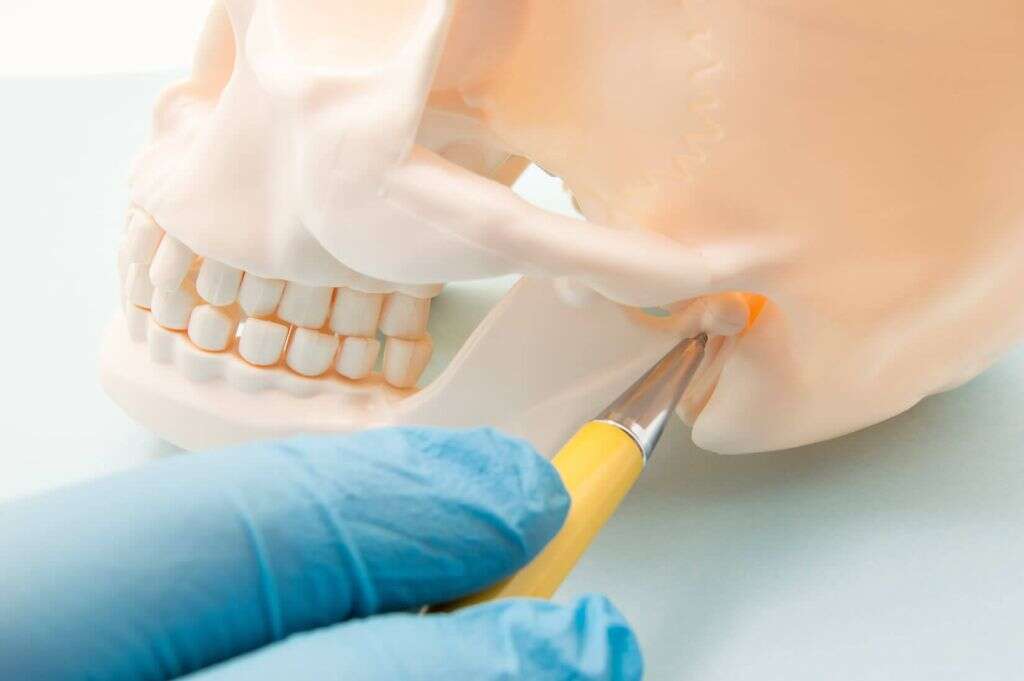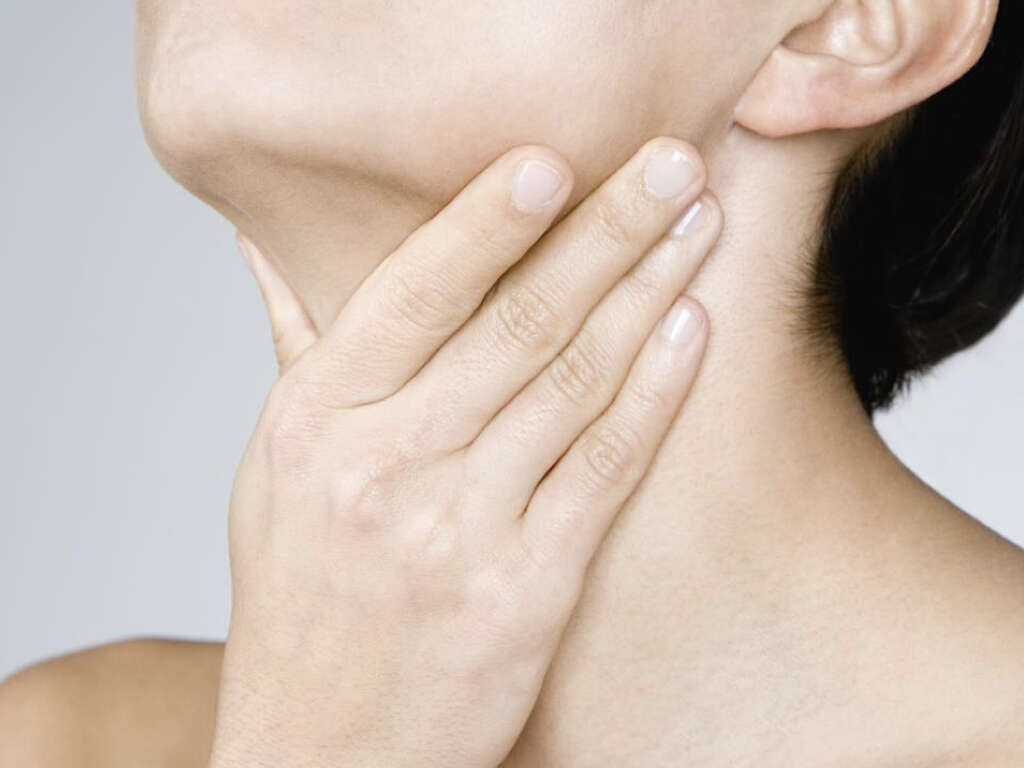What Causes TMJ?
The temporomandibular joint is an important part of the human anatomy. It allows the mouth to open and close for talking and eating. When it is overtaxed, however, it can cause some pretty intense problems.
TMJ syndrome occurs when this joint is stressed. The main symptom of a TMJ problem is pain in the jaw, temples, ears or head. Other signs of a problem include a clicking or popping sound in the jaw or ears, stiff jaw muscles or locking of the joint itself. While most of these symptoms can be treated at home and are usually pretty mild, a chronic issue can develop when you fail to alleviate its cause. Here are 10 of the most common causes of TMJ syndrome and how to address them.

1. Jaw Injuries
If your jaw is injured, it could easily affect the function of the joint. A jaw injury can occur if you are struck by someone or something. Whiplash from a car wreck or other accident can also cause stress along the jawline. Any jaw injury can lead to joint pain or malfunction.
Unfortunately, you are likely to continue to have TMJ troubles until the injury itself is healed. Talk to your doctor about pain medication or muscle relaxers if the problem is more than you can bear.

2. Tooth Decay
Tooth decay starts with worn-down enamel. If your dentist catches a cavity early enough, the problem can be remedied before it ever has the chance to affect your jaw joint. If, however, the cavity forms an abscess or it gets infected, that infection could spread to the tooth’s root. Infected teeth, especially in the back of your mouth, can cause TMJ issues.
The best way to prevent joint pain due to tooth decay is to practice good dental hygiene. Brush and floss your teeth twice a day to remove food particles and pesky bacteria. Make sure you are keeping up with your regular dental checkups, too. Your dentist can find and fix a cavity before the decay goes so deep that it affects the bones and surrounding joints.

3. Infections
The purpose of your sinuses is to trap bacteria from the air you inhale in mucus. This prevents potentially harmful germs from entering your lungs. When you are allergic to these particles or if a buildup occurs, however, you can develop a sinus infection. These infections cause the walls of your sinus cavity to swell, increasing pressure and causing pain. If the swelling gets too bad, the pressure and pain can extend to your jaw.
Some people seem to be plagued by frequently reoccurring sinus infections. Most over-the-counter allergy medications can relieve some of the pressure created by the swelling. If you are experiencing these problems regularly, however, it may be helpful to make an appointment with an allergist. Doctors who specialize in allergy diagnosis and treatment may be able to help you better control your environment by identifying and removing the allergens that trigger your sinus problems the most.

4. Autoimmune Diseases
Any illness that produces inflammation is likely to cause TMJ syndrome flare-ups. If you have lupus, systemic sclerosis, rheumatoid arthritis or any other kind of autoimmune disease, you may experience frequent pain along your jaw. It may be so severe that you are unable to open your mouth fully or your jaw may lock up completely.
The National Center for Biotechnology Information recommends that you talk to your doctor about managing TMJ pain as a part of your overall treatment. Many doctors may be hesitant to add extra medication to relieve this symptom, but there are other options. Biofeedback can help reduce anxiety, which often exacerbates the condition. Heat application and ultrasound measures may also be suggested.

5. Arthritis
Arthritis specifically targets joints, so if you have this problem, you will probably experience TMJ pain. Osteoarthritis causes a breakdown in the joints that goes beyond the wear and tear of the normal aging process. The cartilage loses its elasticity and becomes stiff. This makes it more susceptible to damage and deterioration.
The medication that your doctor prescribes for arthritis may also relieve symptoms of TMJ syndrome. If the pain in your jaw is debilitating (e.g., you cannot move it at all or you cannot open your mouth to talk or eat), other options may be necessary. Heat therapy can help, but if your jaw is completely locked, you should treat it as an emergency.

6. Stress
When you experience emotional stress, it can manifest in physical ways. TMJ pain is a common side effect of too much stress in your life. The muscles around your jaw get tense and can cause pain in the joint. A tension headache may accompany the pain.
The same techniques you use for reducing stress can also get rid of the jaw pain. Find a relaxing activity that you enjoy. Go for a walk, listen to your favorite music or make an appointment with your therapist. Adding yoga or a daily practice of stretching can also be beneficial.

7. Teeth Grinding
Many people grind their teeth while sleeping without even realizing they’re doing it. Often, the first sign that you grind your teeth is pain in your jaw when you wake up. The repetitive movement and stress of bone against bone overworks the joint. As you clench your teeth, the muscles around the joint get tired and can seize up.
The obvious solution is to stop grinding your teeth, and your dentist can help fit you with a mouth guard so that you can break the habit. You may also try a simple exercise when you first wake up. Open your jaw manually, placing your fingers on top of your bottom front teeth and pressing down gently. Try to press down more with each repetition until your jaw moves freely and without pain.

8. Medical Procedures
Any time you have a medical procedure done, there can be side effects. Many patients in recovery often experience TMJ pain, particularly if any part of the procedure happened near the jawline. If you have a breathing tube inserted during a prolonged surgery, for example, the tension required to accommodate the tube may lead to residual pain. Dental surgery, in particular, can cause joint pain when you try to move your jaw afterward.
The treatment for TMJ pain after surgery depends mostly on the kind of surgery you had. After all, you don’t want to delay or complicate your recovery. If you are undergoing physical therapy as part of the healing process, make sure you mention any TMJ pain that you are having. The specialist may be able to include exercises or suggest ways you can relieve the tension and subsequent pain in your jaw.

9. Repetitive Action
Just like any other joint in your body, the temporomandibular joint gets tired when it’s overworked. If you have a habit of chewing gum or chomping on ice throughout the day, your jaw may bear the brunt of that repetitive action.
The simplest way to avoid TMJ pain brought on by overexertion is to break the habit that is causing the pain. This can take some time and dedication. In the meantime, you can incorporate some stretches throughout the day to relieve tension. With your head facing forward, try moving your bottom jaw to one side while glancing in the opposite direction with your eyes. It also helps to open and close your mouth slowly to release pressure.

10. Bad Posture
Every part of the musculoskeletal system is connected. If one part of your body is out of alignment on a regular basis, eventually it will affect other joints or muscle groups. Habitual bad posture collapses your spine from your lower back to the base of your skull. Back problems caused by poor posture can become jaw problems as the discomfort moves upward.
Good posture is more than just standing or sitting up straight. Engage your abdominal muscles to support your back. This helps give you a firm foundation to build on. When you do this, you may notice that your pelvis tucks in slightly. That is your body moving itself into proper alignment. Stand or sit with your knees over your ankles, and try to avoid crossing your legs while sitting. Having the right posture can alleviate all sorts of aches and pains, including TMJ tension.
There are many symptoms to look out for if you think you have TMJ issues. Your jaw may hurt when you yawn or when you open your mouth to eat or speak. If you hear a clicking or popping sound when you move your jaw, there may be unresolved tension there. Of course, if your jaw locks up or you are unable to move it, that is a clear indication of a problem. TMJ syndrome is usually a symptom of another issue, so figuring out what is causing your pain is the first step to treating it. Then you make an informed decision about the best way to get rid of the pain.









